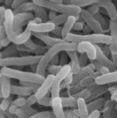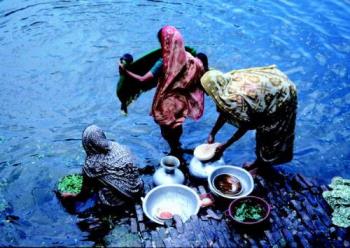Prevention of cholera
By jasjon
@jasjon (252)
Philippines
December 21, 2006 8:40pm CST
Although there is a vaccine for cholera, it offers only limited immunity and the jury is out about whether or not travelers should be vaccinated.
While some doctors recommend it, others doubt its efficacy and suggest that travelers should rather take precautions with food and drinking water.
During cholera epidemics, vaccination is not effective and the best way to tackle the disease is to educate the community on how to make water and food safe and sanitation, or to provide clean water.
A new, oral cholera vaccine has also been developed that is more reliable than the injected form, but it's expensive and doesn't offer complete protection against the disease.
Regretfully, none of the current vaccines have the necessary combination of high efficacy, long duration of protection, simplicity of administration and low cost to make mass vaccination a possibility in cholera areas.
3 people like this
16 responses
@Zhanec (1651)
• Malaysia
22 Dec 06
as i know,oneshould not take raw fish often(like sushi and sellfish..)and make shure ur foods is boiled filtering, or chlorinating water before use. (Boiling works best.) as high temperature can kills those bacteria.Next,to practice Good sanitation. This means keeping things clean. It also means making sure human waste (urine and stool) does not get into food or water supply.
@paulnet (748)
• India
30 Mar 07
It is caused by a specific bacterium, Vibrio cholerae. When an adequate quantity of the bacteria has passed into the stomach in food they accumulate and begin to produce toxins in the body. The cholera toxin has the unpleasant ability to affect the cells of the gastrointestinal tract so that the affected person doesn't just get ordinary diarrhoea, but also starts to lose very large quantities of fluid. It is this fluid loss that can be very serious. Here are some tips :-
Take only boiled water or water that has been sterilised or treated in another way. Hot coffee and tea, fizzy water are usually safe enough to drink.
Boil unpasteurised milk before you take it.
Avoid ice cubes in drinks.
Food must be properly prepared and still hot when it is served.
Avoid raw fruit and vegetables, unless you peel it yourself. n' also raw fish and shellfish.
@lulylove (1560)
• Brazil
22 Dec 06
I have much fear to travel for places that do not demand a vaccine voucher, therefore thus is very easy of a person to receive a virus and to be very sick. I find that no matter how hard seems a preconception, the countries must demand a voucher to asseguar its country of a contagious disease
@cheddah22 (28)
•
22 Dec 06
The cholera vaccine is also about 70% effective against the common strains of travellers diarrhoea. That's not enough efficiency to market as a vaccine for this use, but it is still pretty efficient and worth giving tourists the option. Its been said a hundred times though that the best policy for travellers is just to be ultra careful about what goes near your mouth.
@seqence_destroyer (16)
• Romania
22 Dec 06
A person may get cholera by drinking water or eating food contaminated with the cholera bacterium. In an epidemic, the source of the contamination is usually the feces of an infected person. The disease can spread rapidly in areas with inadequate treatment of sewage and drinking water.
The cholera bacterium may also live in the environment in brackish rivers and coastal waters. Shellfish eaten raw have been a source of cholera, and a few persons in the United States have contracted cholera after eating raw or undercooked shellfish from the Gulf of Mexico. The disease is not likely to spread directly from one person to another; therefore, casual contact with an infected person is not a risk for becoming ill.
@seqence_destroyer (16)
• Romania
22 Dec 06
On January 1991, epidemic cholera appeared in South America and quickly spread to several countries. A few cases have occurred in the United States among persons who traveled to South America or ate contaminated food brought back by travelers.
Cholera has been very rare in industrialized nations for the last 100 years; however, the disease is still common today in other parts of the world, including the Indian subcontinent and sub-Saharan Africa.
Although cholera can be life-threatening, it is easily prevented and treated. In the United States, because of advanced water and sanitation systems, cholera is not a major threat; however, everyone, especially travelers, should be aware of how the disease is transmitted and what can be done to prevent it.
@taruha (559)
• United States
22 Dec 06
Yes, new oral cholera vacination is effective for a limited time period of about 2 years but best way to prevent cholera is to see that water and food are kept clean and hygenicin the area where we stay and the results will be great.In some countries like india,cholera does take away some lives every year during the monsson.
@nevergiveup (94)
• India
22 Dec 06
A person may get cholera by drinking water or eating food contaminated with the cholera bacterium. In an epidemic, the source of the contamination is usually the feces of an infected person. The disease can spread rapidly in areas with inadequate treatment of sewage and drinking water.
The cholera bacterium may also live in the environment in brackish rivers and coastal waters. Shellfish eaten raw have been a source of cholera, and a few persons in the United States have contracted cholera after eating raw or undercooked shellfish from the Gulf of Mexico.
The disease is not likely to spread directly from one person to another; therefore, casual contact with an infected person is not a risk for becoming ill.
he risk for cholera is very low for U.S. travelers visiting areas with epidemic cholera. When simple precautions are observed, contracting the disease is unlikely.
All travelers to areas where cholera has occured should observe the following recomendations: * Drink only water that you have boiled or treated with chlorine or iodine. Other safe beverages include tea and coffee made with boiled water and carbonated, bottled beverages with no ice.
* Eat only foods that have been thoroughly cooked and are still hot, or fruit that you have peeled yourself.
* Avoid undercooked or raw fish or shellfish, including ceviche.
* Make sure all vegetables are cooked -- avoid salads.
* Avoid foods and beverages from street vendors.
* Do not bring perishable seafood back to the United States.
A simple rule of thumb is
"Boil it, cook it, peel it, or forget it. "
@friends4ever (116)
• India
22 Dec 06
In January 1991, epidemic cholera appeared in South America and quickly spread to several countries. A few cases have occurred in the United States among persons who traveled to South America or ate contaminated food brought back by travelers.
Cholera has been very rare in industrialized nations for the last 100 years; however, the disease is still common today in other parts of the world, including the Indian subcontinent and sub-Saharan Africa.
Although cholera can be life-threatening, it is easily prevented and treated. In the United States, because of advanced water and sanitation systems, cholera is not a major threat; however, everyone, especially travelers, should be aware of how the disease is transmitted and what can be done to prevent it.
A person may get cholera by drinking water or eating food contaminated with the cholera bacterium. In an epidemic, the source of the contamination is usually the feces of an infected person. The disease can spread rapidly in areas with inadequate treatment of sewage and drinking water.
The cholera bacterium may also live in the environment in brackish rivers and coastal waters. Shellfish eaten raw have been a source of cholera, and a few persons in the United States have contracted cholera after eating raw or undercooked shellfish from the Gulf of Mexico.
The disease is not likely to spread directly from one person to another; therefore, casual contact with an infected person is not a risk for becoming ill.
All travelers to areas where cholera has occured should observe the following recomendations:
Drink only water that you have boiled or treated with chlorine or iodine. Other safe beverages include tea and coffee made with boiled water and carbonated, bottled beverages with no ice.
Eat only foods that have been thoroughly cooked and are still hot, or fruit that you have peeled yourself.
Avoid undercooked or raw fish or shellfish, including ceviche.
Make sure all vegetables are cooked -- avoid salads.
Avoid foods and beverages from street vendors.
Do not bring perishable seafood back to the United States
@rave883 (140)
• India
22 Dec 06
The best form of cholera prevention is to establish good sanitation and waste treatment systems. In the absence of adequate sewage treatment, the following guidelines should be followed to reduce the possibility of infection:
Boil it. Drink and brush teeth only with water that has been boiled or treated with chlorine or iodine tablets. Safe drinks include coffee and tea made with boiling water or carbonated bottled water and carbonated soft drinks.
Cook it. Eat only thoroughly cooked foods, and eat them while they are still hot. Avoid eating food from street vendors.
Peel it. Eat only fruit or nuts with a thick, intact skin or shell that is removed immediately before eating.
Forget it. Do not eat raw foods such as oysters or ceviche. Avoid salads and raw vegetables. Do not use untreated ice cubes in otherwise safe drinks.
Stay out of it. Do not swim or fish in polluted water.
A cholera vaccine exists that can be given to travelers and residents of areas where cholera is known to be active, but the vaccine is not highly effective. It provides only 25-50% immunity, and then only for a period of about six months. The vaccine is never given to infants under six months of age. The United States Centers for Disease Control and Prevention do not currently recommend cholera vaccination for travelers. Residents of cholera-plagued areas should discuss the value of the vaccine with their doctor.
@rameshgopal365 (918)
• India
22 Dec 06
dear all,
cholera is a serious infectious disease caused by the bacteria Vibrio cholerae, and the preventive measures are available at: http://wonder.cdc.gov/wonder/prevguid/p0000002/p0000002.asp
@volschenkh (1043)
• South Africa
22 Dec 06
Although cholera can be life-threatening, it is easily prevented. In the United States and Western Europe, because of advanced water and sanitation systems, cholera is not a major threat. The last major outbreak of cholera in the United States was in 1911. However, everyone, especially travellers, should be aware of how the disease is transmitted and what can be done to prevent it.
Simple sanitation is usually sufficient to stop an epidemic. There are several points along the transmission path at which the spread may be halted:
Sickbed: Proper disposal and treatment of waste produced by cholera victims.
Sewage: Treatment of general sewage before it enters the waterways.
Sources: Warnings about cholera contamination posted around contaminated water sources.
Sterilization: Boiling, filtering, and chlorination of water before use.
Filtration and boiling is by far the most effective means of halting transmission. Cloth filters, though very basic, have greatly reduced the occurrence of cholera when used in poor villages in Bangladesh that rely on untreated surface water.
In general, education and sanitation are the limiting factors in prevention of cholera epidemics


















